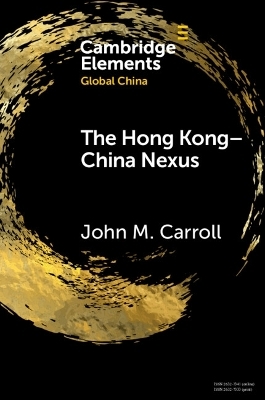
The Hong Kong-China Nexus
A Brief History
Seiten
2022
Cambridge University Press (Verlag)
978-1-108-78977-6 (ISBN)
Cambridge University Press (Verlag)
978-1-108-78977-6 (ISBN)
Hong Kong's relationship with mainland China has deteriorated since July 1997. Yet, for more than 150 years, colonial Hong Kong and China not only coexisted with but benefited each other. This Element shows how the porous boundary between Hong Kong and China defies many assumptions about nationalism, colonialism, and decolonization.
The Occupy Central/Umbrella Movement of 2014 and the anti-extradition protests of 2019 revealed how much Hong Kong's relationship with mainland China has deteriorated since the former British colony returned to Chinese sovereignty in July 1997. With mutual distrust and suspicion at an all-time high, many Hong Kong people have become increasingly hostile toward the Chinese government and the mainland in general, identifying themselves as Hongkongers rather than as Chinese. Yet, as John Carroll shows, for more than 150 years, colonial Hong Kong and China not only coexisted with but benefited each other, even during the anti-imperialist campaigns of the Republican and Communist eras. The porous boundary between Hong Kong and China enabled the two to use each other economically, politically, socially, and culturally. The Hong Kong–China nexus, although firmly embedded in global dynamics of colonialism, Cold War politics, and capitalist expansion, defies many common assumptions about nationalism, colonialism, and decolonization.
The Occupy Central/Umbrella Movement of 2014 and the anti-extradition protests of 2019 revealed how much Hong Kong's relationship with mainland China has deteriorated since the former British colony returned to Chinese sovereignty in July 1997. With mutual distrust and suspicion at an all-time high, many Hong Kong people have become increasingly hostile toward the Chinese government and the mainland in general, identifying themselves as Hongkongers rather than as Chinese. Yet, as John Carroll shows, for more than 150 years, colonial Hong Kong and China not only coexisted with but benefited each other, even during the anti-imperialist campaigns of the Republican and Communist eras. The porous boundary between Hong Kong and China enabled the two to use each other economically, politically, socially, and culturally. The Hong Kong–China nexus, although firmly embedded in global dynamics of colonialism, Cold War politics, and capitalist expansion, defies many common assumptions about nationalism, colonialism, and decolonization.
1. Introducing the Nexus; 2. Hong Kong and Imperial China; 3 Hong Kong and Republican China; 4. Hong Kong and Communist China; 5. Building a New Nexus.
| Erscheinungsdatum | 27.04.2022 |
|---|---|
| Reihe/Serie | Elements in Global China |
| Zusatzinfo | Worked examples or Exercises |
| Verlagsort | Cambridge |
| Sprache | englisch |
| Maße | 151 x 228 mm |
| Gewicht | 150 g |
| Themenwelt | Sozialwissenschaften ► Politik / Verwaltung ► Staat / Verwaltung |
| ISBN-10 | 1-108-78977-3 / 1108789773 |
| ISBN-13 | 978-1-108-78977-6 / 9781108789776 |
| Zustand | Neuware |
| Informationen gemäß Produktsicherheitsverordnung (GPSR) | |
| Haben Sie eine Frage zum Produkt? |
Mehr entdecken
aus dem Bereich
aus dem Bereich
Organisationen steuern, Strukturen schaffen, Prozesse gestalten
Buch | Softcover (2024)
Rehm Verlag
CHF 53,20


